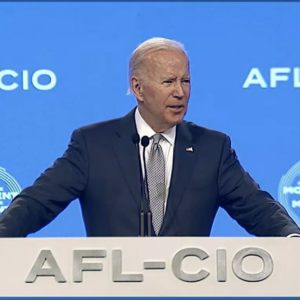President Biden told an audience of unionized workers in Philadelphia last month that his drive for green energy means jobs for them.
“A lot of my friends in organized labor know: When I think climate, I think jobs. I think union jobs,” Biden said.
But for climate activists, “union jobs” can mean “more carbon and less green energy.”
And that, some economists say, is the contradiction at the center of the administration’s policy of spending billions on green energy projects and paying incentives to meet higher “prevailing wage” mandates.
“It’s obviously a terrible strategy,” National Right to Work Committee Vice President Greg Mourad said. “They’re trying to shut down the vast majority of the workforce to help out Joe Biden’s union buddies who spent $2 million to get him elected.”
Just 6 percent of the private-sector labor force belongs to a union.
Biden acknowledged the Inflation Reduction Act was misnamed, saying it was “the single-largest investment in climate action in American history.” The IRA spends $370 billion in green energy subsidies on producing and selling products like electric vehicles and electric heat pumps.
One key element is the 500 percent “bonus” the IRA offers for renewable projects that pay “prevailing wage.” That is, wages are set not by local market forces but by a federally mandated formula that even supporters acknowledge raises labor costs. The rule also applies to private companies accepting federal loan guarantees, the Wall Street Journal reported, such as Ford Motor Co.’s electric car battery plant.
“Folks on the left love these green subsidies,” said Scott Lincicome with the Cato Institute, who compared the labor-climate unity strategy to a “have your cake and eat it too” situation. “These groups want to boost unions,” Lincicome said, so they “start larding down these subsidies with all sorts of mandates, restrictions and cost-inflaters.
“At the end of the day, by doing everything, they end up doing nothing,” Lincicome added.
The math is difficult to dispute. According to a recent report by the Beacon Hill Institute, the “prevailing wage” formula used for federally assisted infrastructure projects adds at least 7 percent to their cost. In other words, instead of 100 electric vehicle charging stations, the same spending will build only 93.
Worse, said Lincicome, that federal spending and its mandates are unnecessary.
“Investors were plowing cash into these technologies before the subsidies,” Lincicome said. Renewable energy investment hit $353 billion in the first half of 2023. Rather than demand, “the problem has long been supply-side stuff. We lack a sufficiently qualified workforce in some of these areas.”
And when the government does step in, it is rarely efficient, said Veronique de Rugy, senior research fellow at the Mercatus Center. She pointed to examples like Solyndra, the Obama-administration-backed solar panel company whose failure cost taxpayers a half-billion dollars.
“Often, these subsidies attract companies that don’t have the right business money or would never be able to make a profit and make a go out of it. They also signal to investors that it’s worth investing in these bad products. … It’s not a good deal,” de Rugy said.
“The actual solution is the free market,” Mourad said. “The federal government should get out of the way and, to the degree that green energy stuff works, it’ll work in places where the economics make it work. Union shops and non-union shops should be able to bid on that work and see who can produce the best bid.”
Higher prices remain another primary concern. Electric vehicles cost more than gas vehicles, on average. The U.S. government has attempted to decrease those costs with various tax credits and subsidies toward green products and the consumers who use them.
So far, it hasn’t worked. Electric vehicle sales are slumping and still represent just 7 percent of new-car sales. Manufacturers are cutting production, and dealers are canceling orders as inventory stacks up — more than a 100-day supply for some models. And that’s with generous federal and state subsidies for buyers.
“In Joe Biden’s mental world, cost isn’t a factor,” Mourad said. “They’ll just spend more government money on it.”


